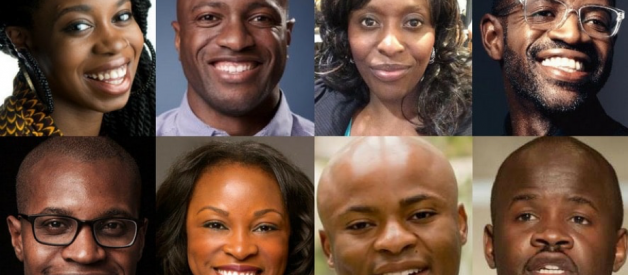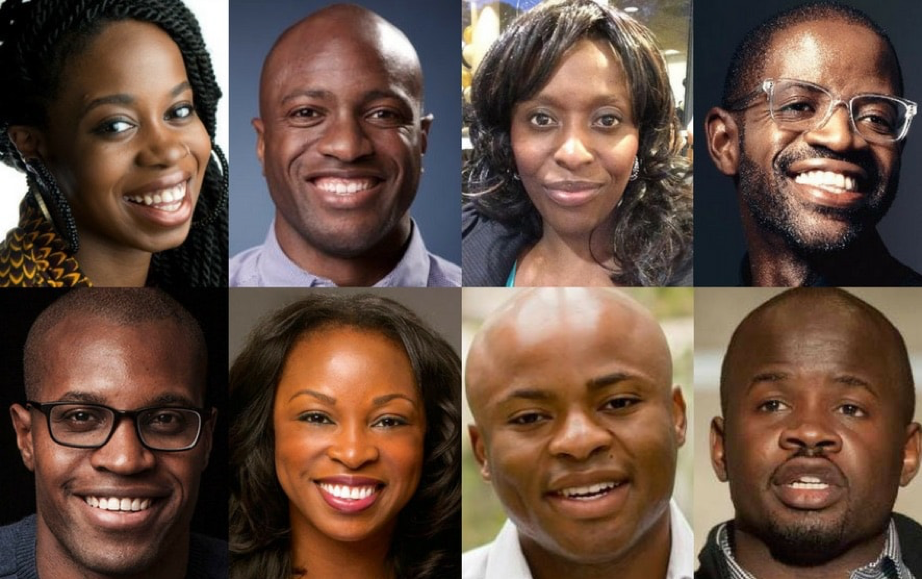 Kelechi Anyadegwu, Ime Archibong, Makinde Adeagbo, Kunbi Tunyoye, Chike Ukaegbo, Tope Awotona, Chinedu Echeruo, Ade Olonoh, Morin Oluwole, and Muoyo Okome ? 10 Nigerian-Americans Making Waves in Tech. Image from UrbanGeekz.com
Kelechi Anyadegwu, Ime Archibong, Makinde Adeagbo, Kunbi Tunyoye, Chike Ukaegbo, Tope Awotona, Chinedu Echeruo, Ade Olonoh, Morin Oluwole, and Muoyo Okome ? 10 Nigerian-Americans Making Waves in Tech. Image from UrbanGeekz.com
I was on a flight to Nova Scotia on which I met Chiasoka, a Nigerian international student, living in St. John?s. She was studying nursing, having graduated in engineering.
We began discussing our parents?, albeit, rigorous but potent parenting methodologies.
Coming from a Caribbean family, education in my family is celebrated at every stride, regardless how minutia the feat may be. My parents have insisted on being part of every ceremony that celebrated my scholastic performance, may it be a Dean?s list reception, kindergarten mini-graduation service or my undergraduate graduation ceremony. And every chance they had to express my academic attainment to their friends and family, they would do so.
Whereas, for Chiasoka, certain academic achievements were nothing, but expected. Therefore, they were not worthy to be praised, let alone, noted. So much so that her mother refused to attend her graduation ceremony. She did not perceive her daughter?s academic accomplishment as an exploit, despite being among the top 10 percent of her graduating class. It was, in her mother?s eyes, the bare minimum that was expected from her. ?Until I earn a post-graduate degree, I will have to content myself with a family-less graduation ceremony? she confessed.
For many westerners, such attitude toward one?s accomplishment would be perceived as callous and sadistic, at best. Yet, for Chiasoka, it is what fueled her, knowing that more is expected as the sky is far from being the limit. And every time she meets or exceeds an expectation, she would, with zeal and valor, vied the next echelon.
Though crude, this ?high expectation attitude? that Nigerian parents have toward their children in everything they undertake is very much conventional in Nigerian households, and part of the rationale, explaining the success of the Nigerian-American diaspora.
A?s, and nothing but A?s
Now that I think of it, the Nigerian friends that I made in university, all of them, excepted for one, was on the Dean?s list. Subsequently, many of them won several awards and accolades for their academic achievements. They all winded up working for reputable firms or being accepted at competitive post-graduate programs.
 Buzzfeed.com ? High Academic achievement is compulsory in an African household, not an alternative.
Buzzfeed.com ? High Academic achievement is compulsory in an African household, not an alternative.
Education is indeed paramount to everything in Nigerian households. So much so that there is ubiquitous aphorism within the Nigerian community which asserts that the best inheritance that a parent can give to their children is not jewelry nor any other material things, but it is a good education.
The best inheritance that a parent can give to their children is not jewelry nor any other materials things, but it is a good education.
Such regard for higher education helps to explain why Nigerian-Americans are more likely to be educated than the average American.
Indeed, Nigerian-Americans have more post-graduate degrees than any other racial or ethnic groups. Albeit, they represent a minutia portion of the U.S. population, 37 percent of them hold a bachelor?s degree and 17 percent a master?s. 29 percent of Nigerian-Americans aged 25 and plus, have a graduate degree, compared to 11 percent of the US population. Nigerian accounts for less than 1 percent of the black population in the United States, yet, they make up nearly 25 percent of all Black students at Harvard Business School. It comes to no surprise that Nigerian-Americans? achievements in the world of education top any other U.S. immigrant groups, including Asian-Americans. Today, a growing number of Nigerian-Americans are entrepreneurs, CEOs and founders of tech companies across the U.S. and abroad.
?You must be a Doctor, Lawyer, Engineer, or a Disgrace to the family??
Nigerian parents also tend to push their children into profitable but arduous careers such as medicine, engineering and law. Recently, Harvard University elected the first black woman to be president of the Harvard Law Review. This black woman happens to be Nigerian, and her name is Imelme A. Umana. Hence why the median annual income of Nigerian diaspora household, according to the Migration Policy Institute, is about $ 52,000, slightly higher than the average $50,000 in the US. They are also more likely to be counted in the higher income brackets as 35% of Nigerian-American households earn the US $90,000 per year.
 Imelme A. Umana, Nigerian-American, became the first Black woman to be elected as president of the Harvard Law Review. Image from Face2FaceAfrica.com
Imelme A. Umana, Nigerian-American, became the first Black woman to be elected as president of the Harvard Law Review. Image from Face2FaceAfrica.com
?Artistic Nigerian-Americans? is a thing!
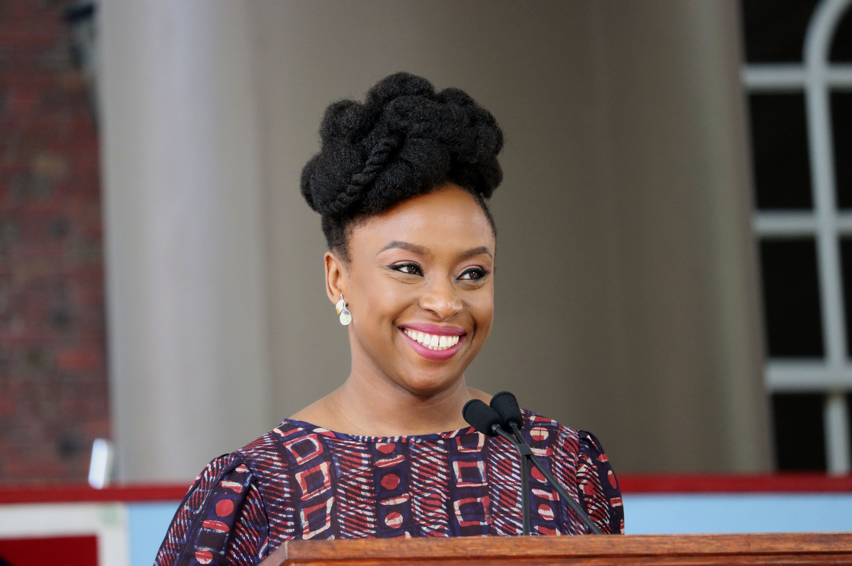 Chimamanda Ngozi Adichie. Image from the Harvard Crimson.
Chimamanda Ngozi Adichie. Image from the Harvard Crimson.
Even those who don?t adhere to such career choices, also exhibit high success in their fields and are expected to do by their elders. For instance, Chimamanda Ngozi Adichie, a Nigerian-American novelist, Yale graduate, and author of the New York Time Best Selling, Americanah, was listed in 2015 in Time Magazine as one of ?the 100 Most Influential People?. And Tomy Adeyemi, Nigerian-American, Harvard graduate, became at the age of 24, the youngest American to have scored a significant book and movie deal, netting in the seven-figures.
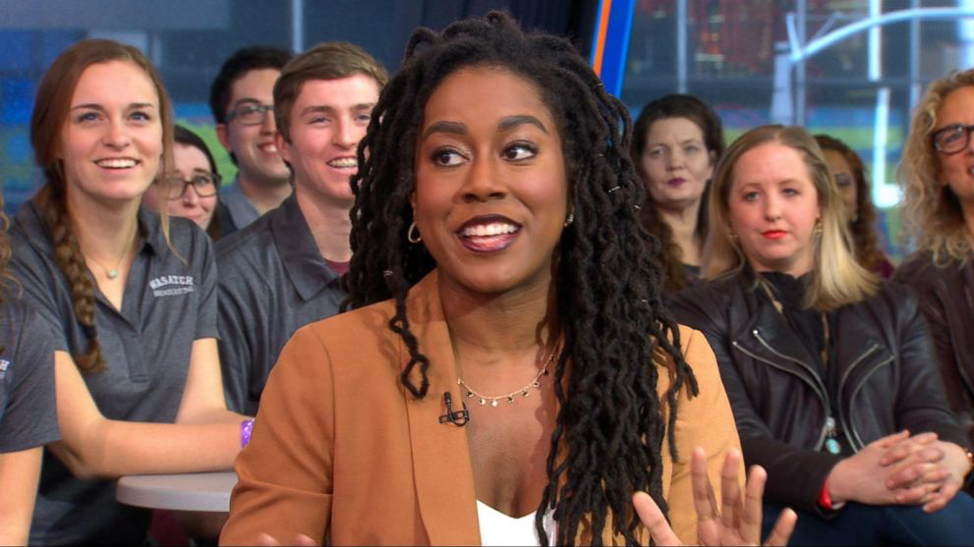 Tomy Adeyemi. Image from ABC.com
Tomy Adeyemi. Image from ABC.com
And as we speak, Nigerians-Americans, such as Chiweteley Ejiofor and Uzo Aduba, are also taking Hollywood as part of their new terrain of excellence.
 Ejiofor played the role of Solomon Northup in 12 Years a Slave which was nominated as Best Actor by the Academy Awards and won the best actor in a leading role by the British Academy Film awards in 2014. Image from RottenTomatoes.com
Ejiofor played the role of Solomon Northup in 12 Years a Slave which was nominated as Best Actor by the Academy Awards and won the best actor in a leading role by the British Academy Film awards in 2014. Image from RottenTomatoes.com Uzo Aduba, Nigerian-American, who plays the role ?Crazy Eyes? from Orange is the New Black. She won several awards including an Emmy Award for Outstanding Supporting Actress in a Drama Series and Outstanding Performance by a Female Actor in a Comedy Series. Image from Biography.com
Uzo Aduba, Nigerian-American, who plays the role ?Crazy Eyes? from Orange is the New Black. She won several awards including an Emmy Award for Outstanding Supporting Actress in a Drama Series and Outstanding Performance by a Female Actor in a Comedy Series. Image from Biography.com
Sports are okay too in a Nigerian household, but?
Apart from the world of arts and engineering, the Nigerian diaspora is now linked among the top American athletes. What is interesting is that sport for Nigerian parents is secondary, never the priority as education is. What they look for in sport, is the opportunity to earn scholarships, which leads to free education. If a Nigerian child happens to make it through a professional league draft, good. But above all things, education is the goal. All things can follow suit.
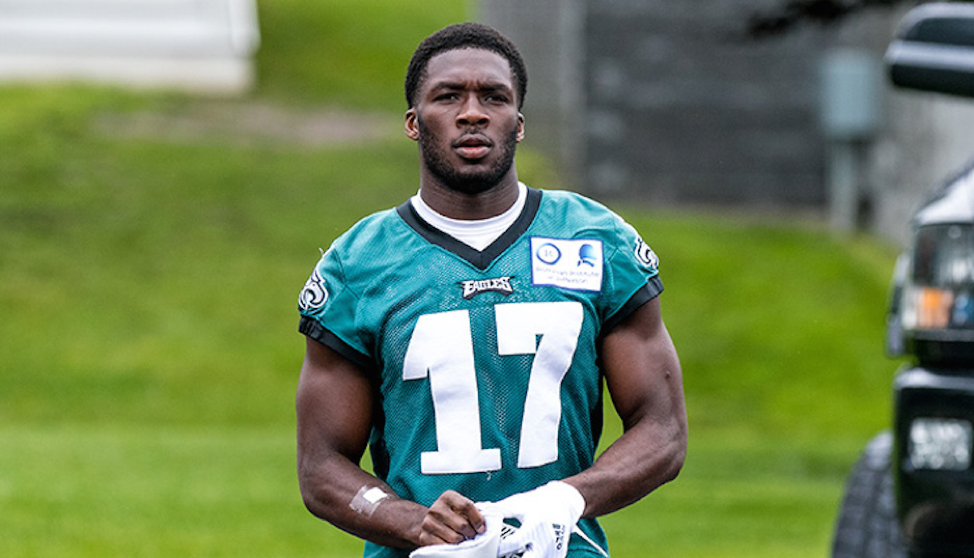 Nelson Agholo, a former student at the USC and now a wide receiver for the P.iladelphia Eagles of the NFL. Image from the Philadelphia Magazine.
Nelson Agholo, a former student at the USC and now a wide receiver for the P.iladelphia Eagles of the NFL. Image from the Philadelphia Magazine.
High expectation tend to lead to higher results according to psychology
Modern-day cognitive psychology supports the notion that expectations can subconsciously and ubiquitously control children?s lives for better or worse. Dr. Meg Griga and Debra Hart from the University of Massachusetts, in their research, revealed that children whose parents and teachers expected them to attend college were more likely to do so.
By merely expressing words of encouragement through which expectations are camouflaged can go a long way. ?Someday you will go to such, and such university like your mom did??or encouraging said-child to take advance placement class ?because it will look good on your college application?, they said, ?represents subtle ? or not so subtle message that permeates the academic and social experiences of college-bound youth?. Although, as a caveat, Nigerian parents are far from being subtle in expressing their expectations to their children. Preferably, they are clear, direct, and sometimes, opposing.
 @_igbokidi_ Nigerian-American screenshotted a conversation with his Nigerian dad, demonstrating the importance of higher education.
@_igbokidi_ Nigerian-American screenshotted a conversation with his Nigerian dad, demonstrating the importance of higher education.
Though I am not from a Nigerian culture, I can attest to the use of ?high expectation? as part of my family ethnology. My dad?s expectations of my brother were high, higher than what my brother thought of himself being capable of accomplishing.
I remember when his GPA was barely a 3.7 as a freshman in high school. This GPA is rather excellent. But my dad was adamant about a 4.0 GPA, so was I. Though my brother felt he was not intelligent enough to attain such goal, my dad and I kept on expressing our desire for him to be accepted at such or so university, by achieving certain grades. Ergo, we pushed him in being more involved both at school and in our community, taking leadership positions, and ensuring that he kept on working hard at school.
By the time my brother graduated from high school, he had achieved a 4.0 GPA, was accepted at one of the most prestigious universities in Canada and won several scholarships for his community and academic achievements.
My father?s expectations were above and beyond what my brother dreamed of, but among other things, my father?s expectations for him played a significant role in driving him toward greater and higher standards.
Our parents, teachers and those close to us have a way of modifying our behaviours. While positive and high expectations can drive one to tackle the tallest mountains, the lack of expectations or negative ones may lead one to despair.
Nigerian parents realized that engaging with their children directly by expressing with no fear and no caveat the expectations that they have for them is a powerful weapon. Such weapon ensures the professional and academic success of their offspring in America. Through, it may appear crude as an approach to raise children, it has worked in their favor as well as in my family.
So perhaps, setting goals for our children at a young age and encouraging them to accomplish more beyond their perceived abilities, may be one of the many solutions to ensuring their success.
